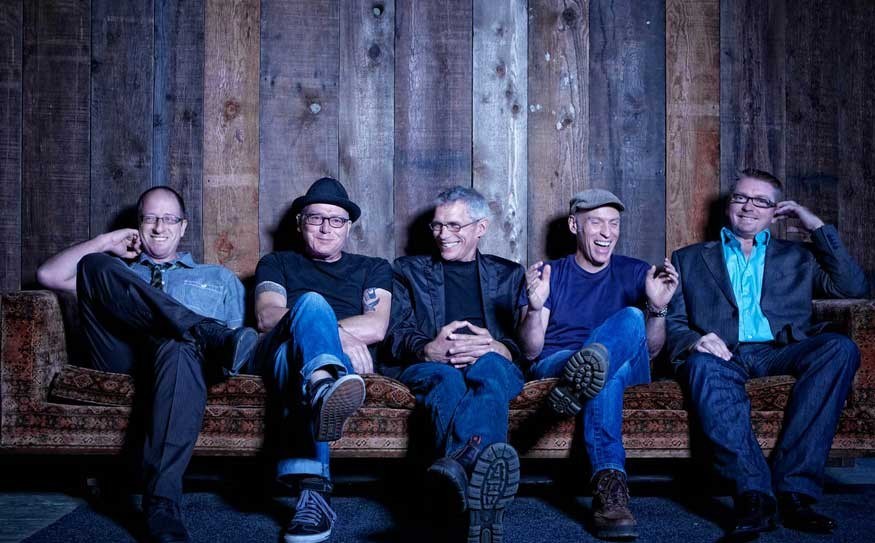Tell Vince Ditrich that Spirit of the West is a "legacy act" and he'll reply with a bemused laugh. At 49 years old, he's not yet old enough to be a grandfather, let alone create any kind of paternal legacy.
And yet Ditrich, who has been drumming in Spirit of the West for 25 years and instrumental in shaping the band's sound from an underground folk act to a staple of Canadian culture, has found himself a granddaddy of this nation's musical lineage.
How peculiar.
"I'm not old! Some mornings I wake up and I sure feel like I am," he says with a laugh, speaking by phone from his home on Vancouver Island. "But, no, I feel as though there's so much more to experience in life and accomplish in life for many, many years — many decades, hopefully — and to be considered a granddaddy is hilarious in some ways."
Since reforming in 2004 after a lengthy hiatus, Spirit of the West has been on a tear, buoyed by their legacy as folk-rock heroes. They've been inducted into the Western Canadian Music Hall of Fame. They played at the 95th anniversary of the Battle at Vimy Ridge. They've played several times for the Armed Forces.
"Can you imagine a band like Spirit of the West in 1987 playing for the Armed Forces?" Ditrich says.
"It's funny how that happens. It's not just us. It's the perception of us and the perception of all things. The new generation selects what it likes and it's the soundtrack of its youth, and it keeps its soundtrack into its later years."
He admits that Spirit of the West's staying power is owed, in large part, to their beloved "Home For a Rest," a Celtic- rock rave-up that predates Ditrich's time in the band. It's a staple not only at all of their live shows, but in university bars and jukeboxes from here to Fredericton. Millions of people have shouted along every word of that song — detailing an epic bender while on tour in England — without ever having heard of the band that wrote it.
"It is the most powerful cog in the machine, as far as awareness," Ditrich says. "That song has had a life of its own, for sure. And it's just one of those songs that just hit. It just seemed to describe a universal feeling of youthful exultation and charming excess, I guess."
Ditrich joined the band shortly after "Home for a Rest," and the album Save This House, was released in 1989. By 1988, the band — guitarist/vocalist John Mann, flutist/guitarist Geoffrey Kelly, multi-instrumentalist Hugh McMillan and bassist Linda McRae — had found much favour on the Canadian folk circuit, particularly with their single "Political" and their blend of folk instrumentation played with punk-rock intensity. Following the success of Save This House, they needed to shake things up a bit.
So they added a drummer. At that time, Ditrich had been playing in various bands and was looking for the right fit.
"I wanted to be in a band, I wanted to make gold records and all these early-20s kind of thoughts," he says, "but at the end of that short process, when I realized that you could easily get into yet another franchise-type band, a band that is really trying to use an American motif and American themes and market themselves as an American band... these bands that weren't really doing anything but were rehashing what has hit.
"So you have a vast proportion of the Canadian music scene back then thinking, 'this is hot now. We're going to be sort of like that, except our singer is prettier.' You don't have to be a rocket scientist to know that this is pointless. You cannot succeed at copying someone else. You have to be original."
Spirit of the West, he says, was not only providing something original to the Canadian milieu, but they were doing it with a genuine intensity. He figured all they needed was a drum kit.
Ditrich joined the band in 1990. The following year, they released Go Figure, their first album to incorporate hard rock elements that alienated some long-time fans of the band. It also earned them their highest-charting single to date, "And if Venice is Sinking."
Since then, Ditrich says, the band has been a tight-knit unit, good times and bad (McRae left the band in 1997 and was replaced by Tobin Frank).
"We've always been so linked emotionally and artistically that when something goes south, everything goes south. When something goes north, everything goes north," he says.
"I think we all enjoy each other's company and we know each other so well, it is no way a company with workers. There's nothing even remotely close to that. This is truly a band. We take the good with the bad."
Which is precisely what has sustained them after all these years. He says he's pleased to have the opportunity to continue playing their songs to old fans and new.
Just don't call him granddaddy.




